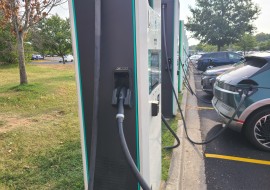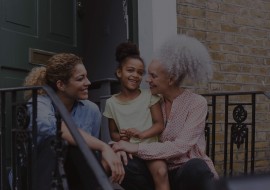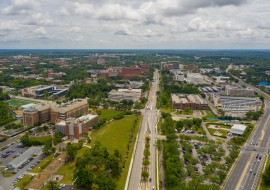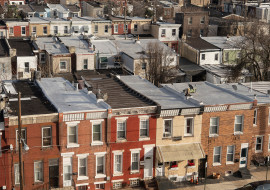Welcome to ACEEE's Energy Equity Topic Page
Many groups have historically been underserved by energy efficiency and other clean energy investments, including Black communities, Indigenous communities, people of color, low-income individuals, youth, older adults, recently arrived immigrants, those with limited English proficiency, and people with disabilities.
The Problem:
The unequal burden faced by historically disinvested communities often stems from systemic racial and social discrimination. For example, past and current policies have disproportionately concentrated low-income households and communities of colors in areas with poor housing, high poverty rates, negative health impacts, and fewer high-quality jobs. A few examples of structural factors that have led to these inequities include redlining, exclusion from financing and investments, employment discrimination, and underfunded schools.These same patterns have also limited access to efficient and healthy homes for these households. For example, ACEEE research has found disproportionate energy burdens nationally, regionally, and across metro areas for certain groups, including low-income households, households of color, renters, and older adults.
Defining Equity in Energy Efficiency:
Equity in energy efficiency represents policies and programs that are informed by the community’s input and designed to meet the needs of all individuals. Equitable energy efficiency policies and programs are based on the principle that each action taken must not deepen, and should reduce, social, environmental, or economic inequalities.
We recognize that many frontline communities and community-based organizations have contribute significant work to this area and ACEEE’s energy equity definition and contributions are building on the expertise and existing efforts of these communities and organizations. ACEEE is building relationships with community-based organizations (CBOs) that are representative of a community or significant segments of a community and provide financial, educational, and/or other resources aimed at enhancing health, wealth, and overall community well-being. We acknowledge that our knowledge in energy equity is growing, and we are committed and open to feedback from our partners and leading energy equity experts.
Advancing equity in energy efficiency and clean energy programs, policies, and investments can ensure that disinvested communities benefit from the clean energy transition. Energy efficiency can reduce energy costs, create jobs, and promote health, safety, and well-being, but efficiency policies and programs can increase inequities if they do not include disinvested communities in these benefits. Decision-makers, including those working in utilities, regulatory bodies, and governments, can help address energy disparities for low-income households, renters, and other marginalized households through well-designed energy efficiency programs and policies.
At ACEEE, we define energy equity using a sustainability framework developed by Angela Park and colleagues at the Urban Sustainability Directors Network. As illustrated in the figure below, this framework includes four dimensions of equity: procedural equity, structural equity, distributional equity, and transgenerational equity. We use this framework to assess the extent to which policies and programs embed inclusive engagement processes, result in a fair distribution of benefits and burdens, and ensure desired outcomes benefit future generations.
Community-based organizations (CBOs) are representative of a community or significant segments of a community and provide financial, educational, and/or other resources aimed at enhancing health, wealth, and overall community well-being.
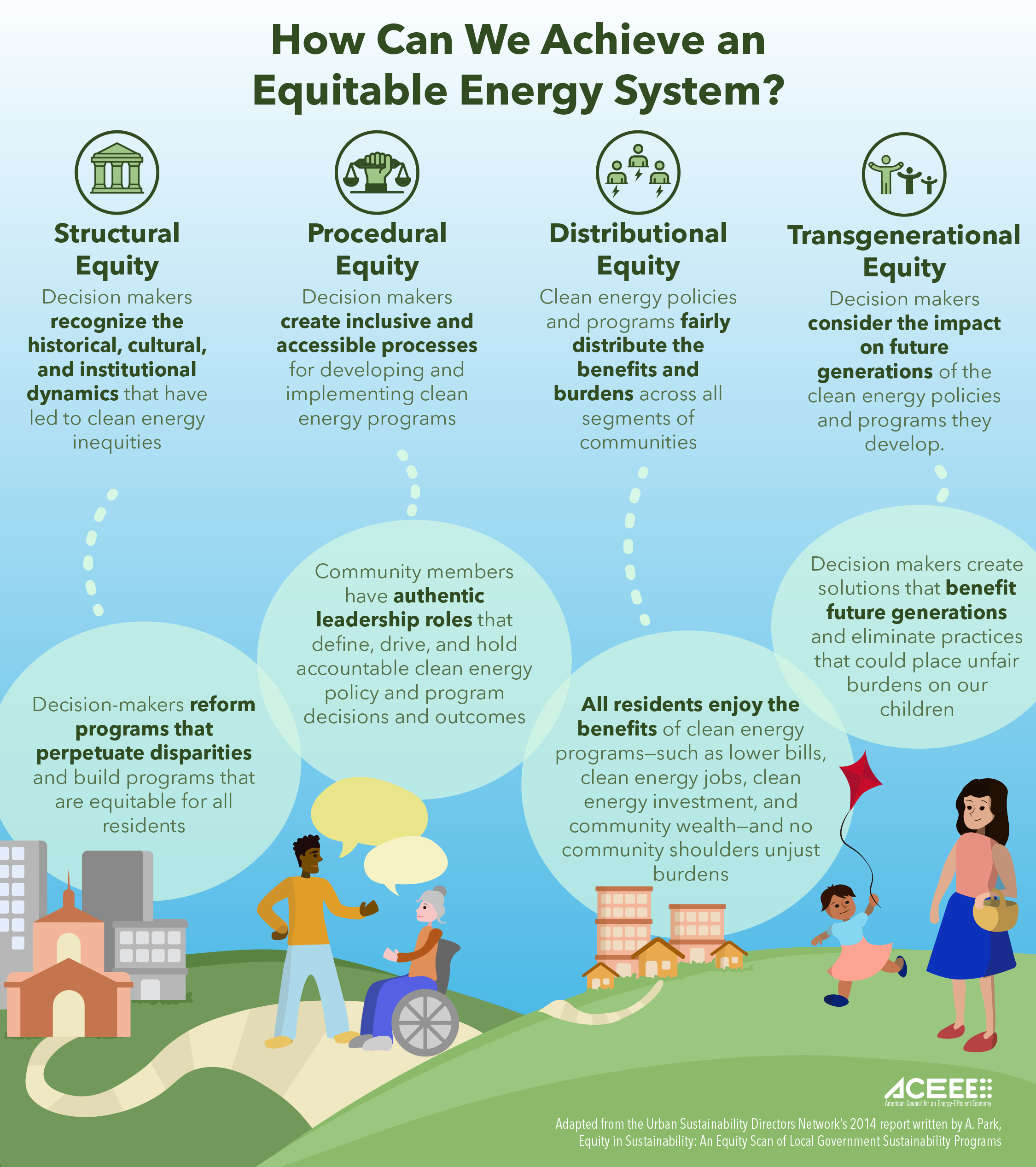
Benefits of energy equity
Incorporating the four dimensions of energy equity in energy efficiency efforts can improve decision-making, change how benefits and burdens are distributed, and address current barriers. Equitable energy policies often improve energy access and affordability, procedural justice, economic participation and community ownership, and health and environmental impacts. The characteristics of an equitable energy system shown below guide us in determining if the energy efficiency sector, or a particular policy or program, is moving toward an equitable future.
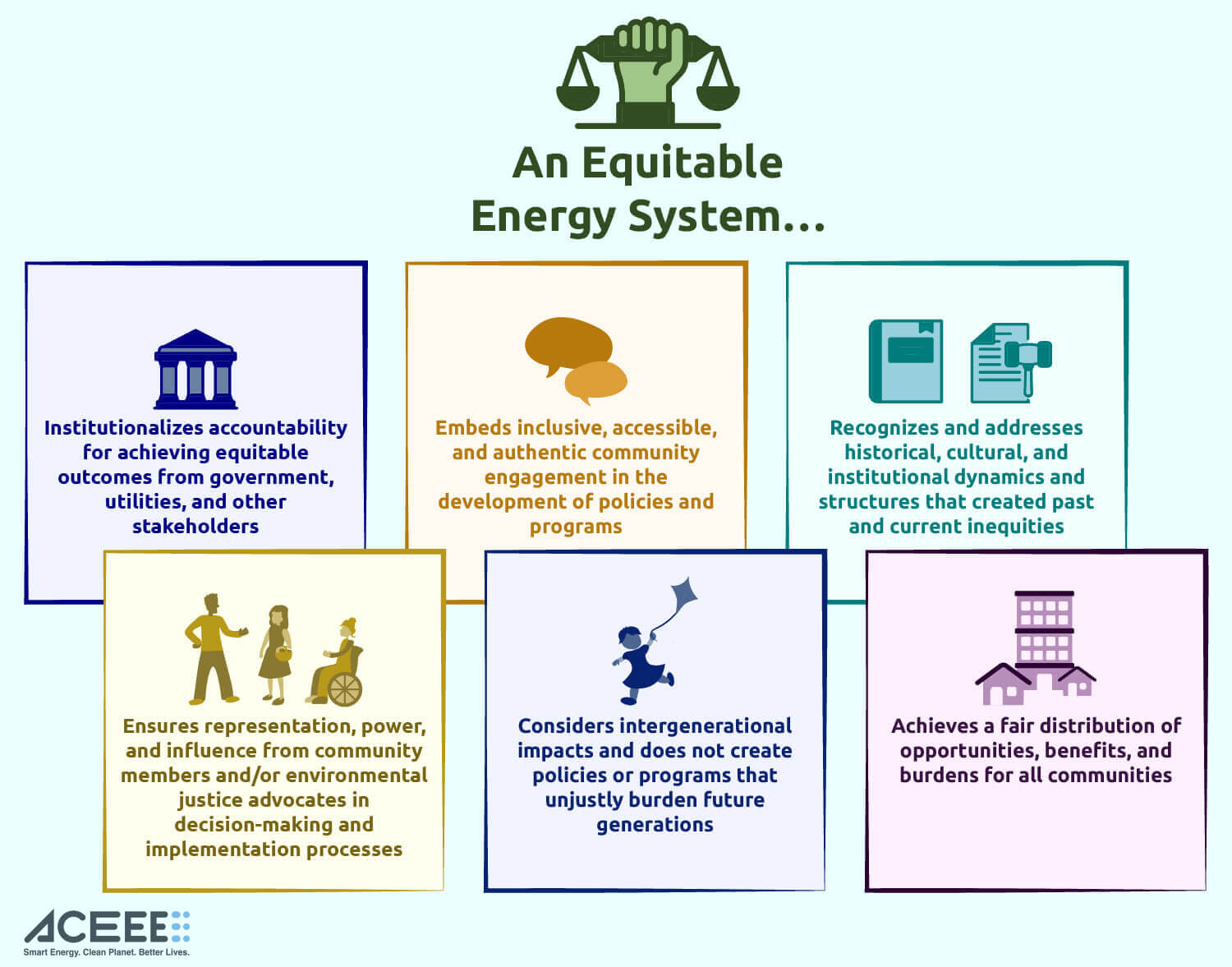
Organizations leading efforts to conceptualize and advance energy equity
ACEEE recognizes that many organizations have contributed significantly to this area of work. We highlight organizations efforts to conceptualize and advance energy equity:
|
|
Our efforts to advance energy equity
ACEEE is working to embed attention to equity in our research and advocacy. Our projects and initiatives related to energy equity include:
Equity-Focused Working Groups
ACEEE convenes working groups focused on identifying best practices for expanding energy equity and improving low-income energy efficiency programs and multifamily energy efficiency programs. The working groups share information on emerging trends, foster peer-to-peer learning among working group members, and promote innovative policies, programs, and strategies. ACEEE also provides technical assistance to working group members to help them create or expand comprehensive and equitable efficiency programs.
Energy Equity for Homeowners Initiative
Our Energy for Equity for Homeowners initiative (2022 – present) works to advance energy efficiency in owner-occupied housing, particularly for low-income homeowners and homeowners of color. In 2022, ACEEE convened over 20 U.S. cities to share their experiences, challenges, and plans for expanding energy efficiency services to more homeowners, specifically low-income homeowners and homeowners of color. In 2023, we also offered customized technical assistance to support work to advance equitable energy efficiency programs or policies for owner-occupied housing.
Related publications:
- Energy Equity for Homeowners: Policy and Program Guide for Local Governments offers strategies for cities to scale energy efficiency in owner-occupied housing. The guide includes lessons learned from several local governments and best practices to ensure equitable outcomes.
Energy Equity for Renters Initiative
ACEEE’s Energy Equity for Renters (2021 – present) initiative promotes affordable, energy-efficient housing for renters. So far, ACEEE has provided technical assistance to five local governments and their community partners to help them develop initiatives to improve rental home energy performance while preserving housing affordability.
Related publications:
- A New Lease on Energy Guidance for Improving Rental Housing Efficiency at the Local Level highlights actions for local governments interested in reducing energy use in rental properties while preserving or increasing housing affordability.
Energy Equity for Renters Toolkit offers strategies and case studies that local governments can use to approach policies and programs that address anti-displacement challenges, funding and financing, community engagement, and accountability. The toolkit is available in English, Spanish, and Vietnamese, and a fact sheet summarizing the toolkit is available in English, Arabic, Somali, Spanish, Swahili, and Vietnamese.
Our Energy Equity for Renters Policy Tracker is an interactive map identifying cities, counties, and states with policies or programs to scale energy efficiency in rental housing while ensuring equitable outcomes.
Leading with Equity Initiative and Equity Working Group
Through our Leading with Equity initiative (2021–present) and Equity Working Group, ACEEE convenes community-based organizations and utilities to jointly define success for equitable decarbonization and embeds what we learn across our research. Via Leading with Equity, we aim to ensure that frontline communities drive the development of priorities and metrics that guide us toward an equitable energy future. Through this initiative we have focused on embedding these priorities in ACEEE’s clean energy scorecards with new and improved equity-related metrics in the City, State, and Utility Scorecards published in 2022-2024. Similarly, ACEEE’s Equity Working Group convenes community-based organizations to provide equity-focused feedback on ACEEE’s work and share information and resources with CBOs.
Related publications:
- ACEEE’s Leading with Equity Initiative: Year Two Recap and Next Steps summarizes the initiative’s workshops, findings, and lessons learned from 2022.
Recommendations for State Decision Makers, Utilities, and Regulators to Advance Energy Equity highlights strategies to advance an equitable energy future through state- and utility-level action. The recommendations were informed by community-based organizations and advocates that participated in the first year of the initiative.
ACEEE Scorecard Equity Metrics Implementation Strategies describe ACEEE’s steps to incorporate workshop participants’ recommendations into our state, utility, and city scorecards.
ACEEE’s Leading with Equity Initiative: Key Findings and Next Steps gives an overview of the initiative and highlights metrics prioritized by workshop participants.
Residential Retrofits for Energy Equity (R2E2)
Through Residential Retrofits for Energy Equity (2022-present), ACEEE and partners organizations provide in-depth training and technical assistance to state, local, and tribal governments and community-based organizations to support energy-saving home retrofits for affordable housing.
R2E2 resources:
Check out recordings of past R2E2 webinars on equity and buildings, community-driven planning, funding sources for affordable housing, and many more topics.
For more information or to contact a researcher, please visit the Local Policy research program.

